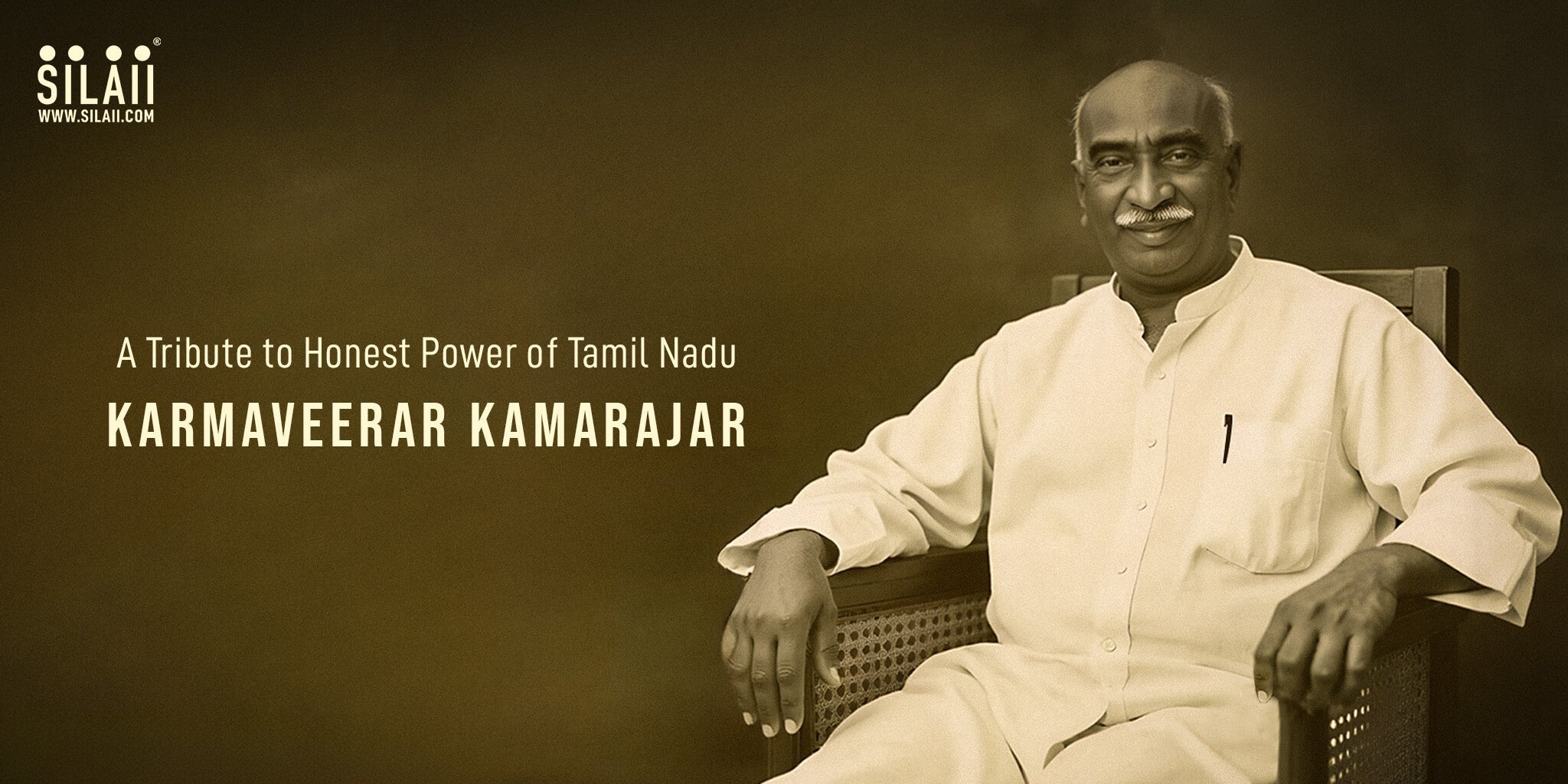 We all know the name. His face is on school walls. his story printed in textbooks, We’re told he was honest, Brave, A man who gave everything and kept nothing for himself. “Kamarajar” We admire him, but from a safe distance. We call him simple, A people’s leader. We say it with respect.
We all know the name. His face is on school walls. his story printed in textbooks, We’re told he was honest, Brave, A man who gave everything and kept nothing for himself. “Kamarajar” We admire him, but from a safe distance. We call him simple, A people’s leader. We say it with respect.
But let’s be honest; No one wants live like him.
Not really; Not in the world we live in now. Not in the age of reels, retweets, and results that must be instant. In an age where success needs to be loud and constant reward, Kamarajar is everything we say we respect but secretly avoid. Because somewhere deep down, we know Kamarajar’s life is too hard for us. Too simple, Too silent, Too real.
This is not one of those “great leader” articles; This is personal. This is not a tribute. You’re not here to clap. You’re here to confront something. You’re here to face something we’ve all quietly chosen to ignore.
Zero is a Hard number:
“The less you own, the less owns you “
Most leaders leave something behind. A house; A statue they funded for themselves. Some proof they were here and mattered. Kamarajar left none of that.
They say when Kamarajar stepped down as Chief Minister, he didn’t go home; because he didn’t have one. No government bungalow, no personal house, not even a rented flat in his name. He simply walked out of office with the same white shirt, the same worn-out watch, and a steel trunk-suitcase that held all his belongings.
K. Kamaraj didn’t have the usual things leaders are known for. His English was broken. He didn’t have degrees or a famous last name. He left school young and found his way into the freedom struggle before he even turned twenty. But what he did have was rare; clarity, patience, and a kind of quiet strength that didn’t need a mic. Slowly, without shortcuts, he rose to become one of the most trusted leaders in the country. He was Chief Minister for nine years. And in those years, Tamil Nadu quietly changed. He didn’t make big promises; he just made sure children went to school. He built thousands of schools, not in headlines, but in forgotten villages. He started the mid-day meal so that hunger wouldn’t keep a child away from learning. He fixed roads. Brought electricity. Helped farmers get water. He didn’t call it development. He just called it work.
Inspiring; isn’t it?
We love these stories; but only from a distance. We say, “He was different.” We applaud the sacrifice. We tell children about it in morning assemblies. We admire it, yes. We tell his story with pride. But only because we don’t have to live it. It’s easy to respect a man like Kamarajar. It’s much harder to live even one minute like him. Because zero is a hard number.
“Heavy is the head that wears no crown.”

We prefer the noise:
“We follow volume, not values.”
Let’s be honest. If Kamarajar contested today, he wouldn’t win. Not because he lacked vision. But because we’ve changed. Kamarajar wouldn’t hire a PR team. He wouldn’t post his every move. He wouldn’t shout. And that’s exactly why we wouldn’t vote for him. Because today, good work isn’t enough.
It has to look good too. We care more about who trends than who to trust.
We want drama, not duty. he stood for something we no longer chase:
Work without noise, Power without greed, And truth that doesn’t sell.
We want leaders who look like leaders.
Sharp suits, Sharp slogans, A sharper social media team.
We don’t ask, “What did they build?”
We ask, “How many followers?” Politics now runs on image; not impact.
We talk about success like it’s a show. Flashy, loud, fast. If someone isn’t visible, we assume they’re nothing. If they don’t promote themselves, we think they’ve done nothing. That’s where we get it wrong. Today, if a leader doesn’t have a team to promote their image, we assume they’re not doing enough. If they don’t tweet, trend, or talk tough on camera, we move on. We call someone inspiring only if their story fits in a post.
Today, politics is a performance. Leaders don’t solve problems they schedule them. Leaders launch YouTube channels with thumbnails more dramatic than their manifestos. They run “news” studios disguised as journalism, where the only breaking news is about themselves. cities are filled with banners for events no one went to, schemes no one really understands. Every new announcement comes with a big smiling photo, not to inform us, but to remind us who to thank. It’s not about the work. It’s about how often they can make us remember who did it.
We think going viral means they’ve done something great. We assume loud voices are strong leaders. But real work doesn’t always trend. And real strength is often quiet. The ones who actually build schools, roads, futures don’t have time to build an image. They don’t shout. They don’t post. So we miss them. We forget the quiet ones. We forget the ones who never asked to be remembered. And maybe that’s the real loss - Not that we don’t have leaders like Kamarajar anymore, But that we’ve stopped looking for them.
“Truth didn’t die. It just stopped trending.”

A life without proof:
“We celebrate the life we’d never dare to live.”
We didn’t forget Kamarajar. We just made him easy to remember. We kept the man, but erased the life. His life makes us uncomfortable. We admire sacrifice but only when it doesn’t ask anything from us. We praise simplicity as long as we don’t have to live it. We say his name but we don’t walk his path.
We haven’t forgotten Kamarajar. Every year, we talk about his honesty, his sacrifice, his simple life. But the truth is, we only remember the easy parts. The clean version. The version that sounds nice in a speech. We see a smiling photo, not a hard life.
Because deep down, we don’t want that life. We respect it, but we don’t want it. A life without proof feels invisible to us. If someone doesn’t promote themselves, we assume they’ve done nothing. And I’m not blaming you , that’s how we built these days. Most of us want financial comfort. Kamarajar built schools, not hype. But we want instant results, viral moments. Long-term work feels too slow for us. selflessness makes us uncomfortable. We’re used to doing things for recognition. Most of us want to be seen. Heard. Celebrated. But Kamarajar didn’t care if anyone noticed. And that’s hard for us to relate to.
I’m not blaming you. I’m one amongst you. We admire men like him as long as we don’t have to become them. It’s not blame. It’s just the truth.
“We frame sacrifice. Not follow it.”

Beyond all applause:
"A name remembered is not a life understood."
Living like Kamarajar doesn’t just demand sacrifice. It breaks the whole idea of success we’re taught to chase. We keep saying he was different.
But maybe the truth is: we never wanted to be like him.
Because he makes everything we chase look small.
We admire Kamarajar because we don’t have to be him. But what if we tried? What if a leader today gave up the everything; no house, no branding?
What if they travelled in third class, stood at the back, let others speak first? No viral campaigns. No legacy to cash in.
Could they survive? Could we accept them?
Can someone still lead without money, without slogans, without needing to be seen?
If You Lived Like Him - Just One Day
You wake up on a mat, not a mattress.
You wash your own clothes, wear the same white shirt.
You listen more than you speak.
You visit a school; not to cut a ribbon, but to ask if the roof still leaks.
You eat after everyone else, Quietly No photos. You go to sleep knowing no one noticed but something small got better because you showed up.
Now ask yourself; could you do this again tomorrow?
We don’t have to feel ashamed. This world wasn’t built for people like him. We don’t have to feel bad. we were never taught to live like him. we were taught to win, To climb, To show. So let’s lie to ourselves that, it’s not our fault.
But now we know everything, so;
If someone like Kamarajar stood up today; what will we do ?
By - Abithavasiyan. M


